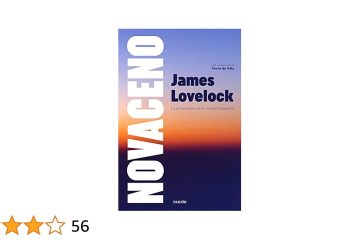In a world where environmental consciousness is on the rise, the debate surrounding the renowned scientist James Lovelock’s stance on veganism takes center stage. Delving into the intriguing intersection between dietary choices and planetary health, we unravel the fascinating narrative behind Lovelock’s views on veganism. Join us on a captivating journey as we explore the connection between one man’s scientific legacy and the ethical implications of adopting a plant-based lifestyle.
Table of Contents
- Exploring James Lovelock’s Views on Veganism
- Insights into the Relationship Between Veganism and Gaia Theory
- Understanding the Environmental Impact of Vegan Lifestyle According to James Lovelock
- Recommendations for Incorporating Lovelock’s Ideas on Veganism into Daily Life
- Q&A
- Future Outlook
Exploring James Lovelock’s Views on Veganism
James Lovelock, a renowned environmentalist, offers thought-provoking insights on the intersection of veganism and sustainability. Lovelock’s holistic viewpoint emphasizes the impact of dietary choices on the environment, highlighting the pivotal role that veganism can play in mitigating climate change. By promoting plant-based diets, Lovelock advocates for a shift towards sustainable food practices that align with his Gaia theory, which positions Earth as a self-regulating system.
Through his work, Lovelock challenges individuals to reconsider their relationship with nature and adopt ethical eating habits that support ecological balance. His belief in the interconnectedness of all living beings underscores the importance of embracing veganism as a means to protect the planet and foster harmonious coexistence among species. By engaging with Lovelock’s perspective on veganism, individuals are encouraged to reflect on the profound implications of their food choices and strive towards a more sustainable future for generations to come.

Insights into the Relationship Between Veganism and Gaia Theory
Exploring the interconnectedness between veganism and Gaia Theory reveals fascinating parallels in the ethos of sustainability and harmony with nature. Both concepts emphasize the importance of nurturing a balanced relationship with the planet, recognizing the Earth as a self-regulating system.
Adopting a vegan lifestyle aligns with the Gaia Theory’s notion that Earth functions as a single organism where all living beings are interconnected. By choosing plant-based diets, individuals contribute to the well-being of the planet, reducing their ecological footprint and promoting biodiversity.

Understanding the Environmental Impact of Vegan Lifestyle According to James Lovelock
James Lovelock’s perspective on the environmental impact of adopting a vegan lifestyle brings to light compelling insights that challenge conventional beliefs. By delving into the intricate connections between our dietary choices and the health of our planet, Lovelock underscores how embracing plant-based eating can significantly reduce our ecological footprint.
<p>In his thought-provoking analysis, Lovelock emphasizes the following key points:</p>
<ul>
<li><strong>Climate Mitigation:</strong> Veganism plays a crucial role in combating climate change by reducing the demand for livestock farming, a major contributor to greenhouse gas emissions.</li>
<li><strong>Biodiversity Preservation:</strong> Shifting to a vegan diet helps protect biodiversity by minimizing deforestation for animal agriculture and promoting sustainable land use practices.</li>
<li><strong>Resource Conservation:</strong> Opting for plant-based meals conserves vital resources such as water and land, fostering a more environmentally sustainable food system.</li>
</ul>
<table class="wp-block-table">
<tr>
<td><strong>Insight 1</strong></td>
<td>Climate Mitigation</td>
</tr>
<tr>
<td><strong>Insight 2</strong></td>
<td>Biodiversity Preservation</td>
</tr>
<tr>
<td><strong>Insight 3</strong></td>
<td>Resource Conservation</td>
</tr>
</table>
Recommendations for Incorporating Lovelock’s Ideas on Veganism into Daily Life
To truly embrace Lovelock’s ideas on veganism in your daily life, consider making small yet impactful changes that align with his ecological philosophy. Start by incorporating plant-based meals into your routine, focusing on a diverse array of fruits, vegetables, legumes, and whole grains. By doing so, you not only support sustainable food practices but also contribute to reducing the carbon footprint associated with animal agriculture.
Additionally, seek out local and organic produce whenever possible to support environmental sustainability and reduce the transportation emissions linked to food miles. Engage in community-supported agriculture (CSA) programs or visit farmers’ markets to connect with the source of your food and promote a more sustainable food system. Remember, every meal is an opportunity to make a positive impact on both your health and the planet.
Q&A
Q&A: Unveiling the Connection Between James Lovelock and Veganism
Q1: Can you shed some light on who James Lovelock is and why he is significant in the realm of environmental science?
A: James Lovelock is an esteemed environmental scientist and renowned futurist best known for proposing the Gaia hypothesis, suggesting that the Earth functions as a self-regulating system akin to a living organism. His work has been pivotal in shaping the discourse on climate change and planetary health.
Q2: How does James Lovelock’s work intersect with the concept of veganism?
A: While James Lovelock himself is not a vegan, the principles underlying his ecological theories often resonate with those advocating for plant-based lifestyles. Lovelock’s emphasis on the interconnectedness of all life forms and the delicate balance of ecosystems aligns closely with the ethical and environmental motivations behind veganism.
Q3: In what ways can embracing veganism contribute to the preservation of the planet, as per James Lovelock’s perspective?
A: Embracing a vegan lifestyle can have a positive impact on the environment by reducing greenhouse gas emissions, minimizing deforestation for livestock grazing, and conserving water resources. James Lovelock’s holistic view of Earth as a complex, interdependent system suggests that embracing veganism can be a step towards restoring harmony within this intricate web of life.
Q4: How might James Lovelock’s Gaia hypothesis influence individuals’ choices towards adopting a vegan diet?
A: The Gaia hypothesis posits that the Earth functions as a self-regulating entity, emphasizing the importance of maintaining balance and resilience within ecosystems. For those inspired by Lovelock’s theories, the idea of supporting the Earth’s natural equilibrium by choosing a vegan diet may resonate as a means of promoting sustainability and minimizing ecological disruptions.
Q5: As a visionary thinker, how does James Lovelock’s perspective on sustainability and planetary well-being encourage conversations around veganism and ethical consumption practices?
A: James Lovelock’s holistic vision of Earth as a dynamic and interconnected system underscores the urgency of adopting sustainable practices to preserve the planet’s health. By prompting discussions on ethical consumption and mindful food choices, Lovelock’s ideas serve as a catalyst for reevaluating our relationship with the environment and embracing lifestyles that prioritize the well-being of both the planet and its inhabitants.
Embark on a journey exploring the intriguing intersections between James Lovelock’s environmental theories and the principles of veganism, igniting a dialogue that illuminates the potential of conscious choices in safeguarding our shared home, Earth.
Future Outlook
In conclusion, James Lovelock’s journey into exploring veganism sheds light on the interconnectedness between our dietary choices and the health of our planet. As we contemplate the impact of our food habits on the environment, Lovelock’s perspective challenges us to reevaluate our relationship with the food we consume. Whether you are a staunch supporter of veganism or simply curious about its implications, delving into Lovelock’s insights can spark meaningful conversations about sustainability and ethical eating. Let’s continue to ponder the profound influence of our food choices and strive towards a more harmonious coexistence with nature.



0 Comments